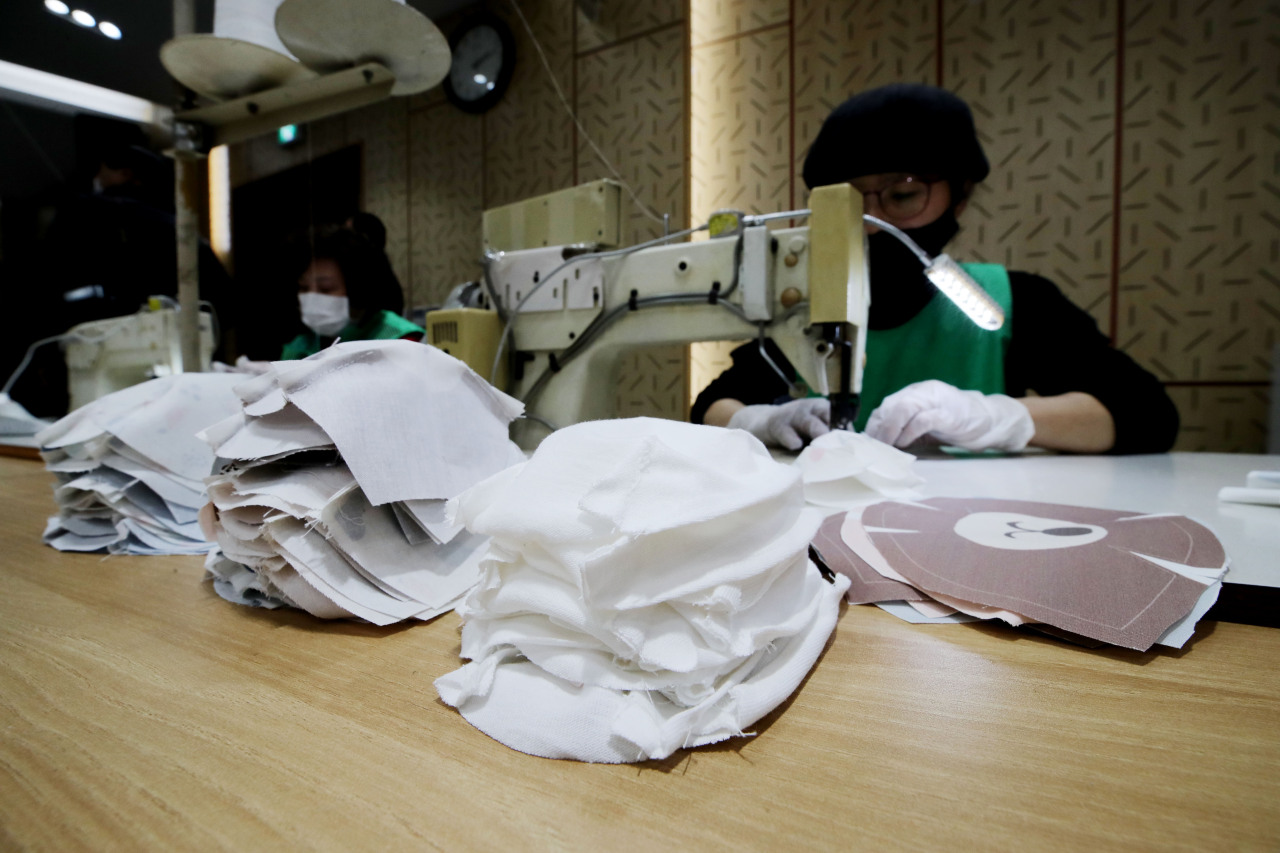[Weekender] Keeping safe from virus
Some seek peace of mind with ‘full protection,’ while others opt for DIY solutions
By Kim Bo-gyungPublished : March 5, 2020 - 16:19

Wearing face masks on buses and subways -- and even at the office -- has become the new normal in South Korea amid the coronavirus outbreak.
People are washing their hands and sanitizing the surfaces they’ve touched as often as possible, and personal hygiene products are in high demand.
In the face of scarcity, some people have opted to make their own masks and sanitizers, while retailers have introduced some products that are out of the ordinary, such as an “anti-coronavirus hat” and “anti-coronavirus glasses.”
Moon Ji-young, 36, bought one of those extra-wide-brimmed hats for her kid.
“My child hates wearing facial masks. … The hat may not be able to block the virus completely since the bottom of it is open. But I think it should be able to prevent infection from water droplets to a certain degree,” she told The Korea Herald.
Also on Moon’s online shopping list earlier this week were so-called anti-coronavirus glasses, since she discovered the virus can infiltrate the body through the eyes.
Moon and her two children -- ages 3 and 6 -- in Gimpo, Gyeonggi Province, plan to wear the hats until the outbreak subsides even though they are uncomfortable as the plastic barrier traps moisture inside, and even though they can hinder hearing.
Most anti-coronavirus hats sold on- and offline cost between 10,000 won ($8.40) and 20,000 won, and take the form of bucket hats with clear plastic barriers attached at the bottom that resemble bee veils.
Among the other fashion items spurred by the novel coronavirus are hoodies with transparent plastic sheets that cover the wearer’s face and mask-caps with a small fastener on each side where a mask can be attached.
Kim Hwa-hee, 28, recently started wearing safety glasses because the exact route of transmission for COVID-19 remains unclear.
“I bought the glasses online to completely root out the possibility of catching the virus. I saw (somewhere) online that contraction is possible through the eyes and there are many patients whose infection route is unknown,” Kim said to The Korea Herald.
“Though it makes me feel better, the glasses are definitely uncomfortable because sometimes it gets moist. But I like it. It has brought peace of mind.”
Health experts are uncertain about the efficacy of these new protective items, as they are uncertified, and advised the public to focus on personal hygiene.
Some Korean customers are taking a two-track strategy to fend off the virus, turning to functional foods to boost their immune systems.
On the back of increased demand, Korea’s 4.6 trillion won health food market is projected to record 5 to 9 percent growth this year and could be worth as much as 4.9 trillion won by the end of 2020, according to market research group Kantar.
Health foods and supplements such as red ginseng expanded their markets during the 2009 swine flu pandemic and the 2015 MERS outbreak.
Sales of red ginseng products, for instance, soared 57 percent six months after the 2009 swine flu pandemic started, compared with six months before, according to Kantar.
Some companies have come under fire for misleading and false advertisements, claiming their products can bolster the immune system so the user can better resist COVID-19 and fight off the virus.
The Ministry of Food and Drug Safety said it has not certified any product for that purpose so far.
Despite the government’s vigorous efforts to stabilize supplies and prices of face masks, the market is faced with a shortage and some customers are taking a proactive approach by making their own.
“As you may well know, masks are sold at an extremely high price due to scarcity, not to mention that these expensive masks are not available for purchase. So I started to look for an alternative,” Yang Bo-sang, 44, told The Korea Herald.
Yang, a father to two daughters in Seoul, has named his handmade mask the “BS70,” which is derived from his initials and a “feeling it can filter out 70 percent of the virus.”
Yang crafted cotton masks with electrostatic cotton filters attached inside after coming across information showing that electrostatic cotton is effective as a filter.
According to Statistics Korea, disposable masks are selling online at over 4,000 won each. In contrast, one of Yang’s handmade masks costs approximately 1,010 won.
DIY cotton masks are not only affordable, but are just as effective government-certified masks in blocking water droplets.
“It looks like plain cotton masks are effective when blocking large droplets (over 3 square micrometers). But for complete prevention it would be preferable to use them after adding electrostatic filter cotton inside,” according to the Seoul Research Institute of Public Health and Environment.
Cotton masks with electrostatic cotton filters attached inside were able to filter out an average of 80 to 95 percent of particles, and government-certified KF 80 masks filtered out over 80 percent, according to a study by the public health institute.
It added that electrostatic cotton filters had to be replaced after each use in order to offer full protection.
By Kim Bo-gyung (lisakim425@heraldcorp.com)








![[KH Explains] How should Korea adjust its trade defenses against Chinese EVs?](http://res.heraldm.com/phpwas/restmb_idxmake.php?idx=644&simg=/content/image/2024/04/15/20240415050562_0.jpg&u=20240415144419)










![[Today’s K-pop] Stray Kids to return soon: report](http://res.heraldm.com/phpwas/restmb_idxmake.php?idx=642&simg=/content/image/2024/04/16/20240416050713_0.jpg&u=)